|
|
|
Sort Order |
|
|
|
Items / Page
|
|
|
|
|
|
|
| Srl | Item |
| 1 |
ID:
120295
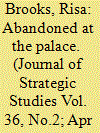

|
|
|
|
|
| Publication |
2013.
|
| Summary/Abstract |
Many analysts have focused on the Tunisian protests and the economic and political grievances that fueled them. Equally central, however, was the role played by the military leadership and the decision to forgo using force to actively suppress the protesters. Contrary to arguments that stress the reflexively apolitical or professional nature of the military, or its leaders' normative commitment to supporting the protesters, this article explains how the decisions made reflected political calculations and served the military's organizational interests. Although heralded as the savior of the revolution, the Tunisian military acted out of its own organizational self-interest in defecting from the Ben Ali regime.
|
|
|
|
|
|
|
|
|
|
|
|
|
|
|
|
| 2 |
ID:
184949
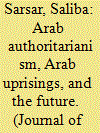

|
|
|
| 3 |
ID:
146710
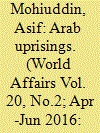

|
|
|
|
|
| Contents |
This article points out that the watershed events that initiated the period of contentious politics in the Arab world after 2010 not only reshaped regional and global politics but also challenged state power and long held theories dominant in the region, particularly about the popular acquiescence to regime control. They opened new areas of inquiry as well. By their impact on regional and international politics, these events have drawn the attention of scholars across the world. Some argue that these changes occurred as a result of the globalisation of democratic norms, new media technologies and regional structural changes, which led to widespread demonstrations, both violent and nonviolent. In calling for the downfall of the entrenched regimes, they signalled a breakdown of the social contract that had existed between the people and their rulers since independence.
|
|
|
|
|
|
|
|
|
|
|
|
|
|
|
|
| 4 |
ID:
120780
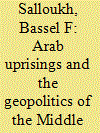

|
|
|
|
|
| Publication |
2013.
|
| Summary/Abstract |
The contest between Saudi Arabia and Iran played out in Lebanon, the West Bank and Gaza Strip, postwar Iraq and, to a lesser extent, Yemen and Bahrain, has shaped the geopolitics of the region since the 2003 US invasion and occupation of Iraq. The Arab uprisings intensified this geopolitical contest and spread it to Syria. The sectarianisation of the region's geopolitical battles, and the instrumental use of some of the uprisings for geopolitical ends, has hardened sectarian sentiments across the region, complicated post-authoritarian democratic transitions, and, at least in Syria's case, transformed its popular uprising into a veritable civil war.
|
|
|
|
|
|
|
|
|
|
|
|
|
|
|
|
| 5 |
ID:
153872
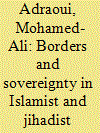

|
|
|
|
|
| Summary/Abstract |
This article explores how Islamists and jihadists have framed issues pertaining to sovereignty, borders, as well as political and religious identity, over the last century. At a time when the territorial delimitations of several Arab countries seem more fickle than ever, it is necessary to address how Islamists and jihadists view the historical and contemporary aspects of borders and sovereignty. The Islamists, on the one hand—whose aim is creating a caliphate—have had to deal with unexpected realities, turning inevitably to some extent of reform of their original revolutionary ambition. The jihadists, on the other hand, while remaining committed to an armed struggle to unify Muslims worldwide, do not advocate for any action other than global insurrection. By focusing on the writings and discourses of major Islamist and jihadist leaders, it thus appears that the study of borders and sovereignty is indispensable to understanding the similarities and differences between the two ideologies. In addition, the study of borders and sovereignty allows for predicting developments in the region that largely pertain to the desire to achieve (jihadists) or amend (modern Islamists) the original revisionist design. It appears that borders, territory and sovereignty prove to be significant constraints for both Islamists and jihadists. Evidently, both Islamists and jihadists have reacted in diverging ways to the political and cultural realities that stand against their founding ideology—with certain Islamist movements having thus nationalized their doctrine, while jihadists still remain eager to achieve their original ambition.
|
|
|
|
|
|
|
|
|
|
|
|
|
|
|
|
| 6 |
ID:
121614
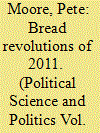

|
|
|
|
|
| Publication |
2013.
|
| Summary/Abstract |
Whether it was bread-wielding Tunisians, marching Suez workers, or Yemeni protestors chanting against corruption, the 2011 Arab uprisings put political economy issues front and center. Indeed, a critical thread throughout the region's uprisings has been the simple question: "where has the money gone?" And though the field of political economy is multifaceted, the basic refrain "follow the money" unites most of it. Having students engage and debate political economy issues helps counteract much of the popular media's fixation on violence, terrorism, and sectarianism that too often exclusively frames how Americans understand the Middle East. Political economy gets at some of the most important (but certainly not all) factors and dynamics that define social and political life in the Middle East. A political economy approach also reinforces the critical disposition and tools of inquiry to instill in university undergraduates. In particular, the approach stresses to students that the realms of the economy and the political are hardly distinct, and therefore a more complete explanation for the events of 2011, and after, require grasping that interaction (Lindblom 1982; Polanyi 2001).
|
|
|
|
|
|
|
|
|
|
|
|
|
|
|
|
| 7 |
ID:
126864


|
|
|
| 8 |
ID:
171929


|
|
|
|
|
| Summary/Abstract |
In this article, we aim at sharpening common understandings of the notion of political crisis to better explain the trajectories of authoritarian transformations during popular uprisings. We make three major claims. First, we propose a definition of crisis as brief moments of institutional fluidity and openness in which a process can take different directions. We delineate the crisis concept from the concept of critical junctures and outline how our approach contributes to the methodological debate on ‘near misses’. Second, we indicate how the de-institutionalisation processes leading up to a crisis are to be analytically distinguished from within-crisis moments. We argue in favour of a discontinuity approach that takes into account the different temporalities of gradual lead-up processes and rapid within-crisis dynamics. Finally, we illustrate our theoretical and analytical reasoning with concrete cases from the authoritarian crises of the Arab uprisings, whilst suggesting that our argument can travel to other areas of research in which crisis narratives have gained prominence.
|
|
|
|
|
|
|
|
|
|
|
|
|
|
|
|
| 9 |
ID:
121612
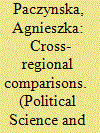

|
|
|
|
|
| Publication |
2013.
|
| Summary/Abstract |
The Arab uprisings, like the fall of the Berlin Wall more than two decades ago, are watershed events that have raised fundamental questions about our understanding of the processes of political change, the emergence and diffusion of contentious collective action, and the role of the international context in facilitating or hindering political change. The uprisings have further strengthened a growing focus within Middle Eastern studies on framing questions about the social, economic, and political dynamics in the region in ways that allow for more robust linkages with comparative theorizing about the dynamics of contentious collective action and the processes of political change. In other words, the Arab uprisings have injected new energy into the comparative study of contentious politics. In addition to new research agendas the uprisings have also provided opportunities for introducing students in survey and theory courses to the region's political dynamics, enriching students' engagement with theoretical concepts and honing their critical thinking and analytical skills while making the Middle East less "exceptional" for the students. Here, I focus on how incorporating of Middle Eastern cases allows instructors to raise questions and engage students in discussions about the emergence and diffusion of contentious collective action.
|
|
|
|
|
|
|
|
|
|
|
|
|
|
|
|
| 10 |
ID:
175528
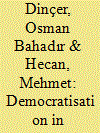

|
|
|
|
|
| Summary/Abstract |
Instead of writing off the post-uprising period in the Middle East and North Africa (MENA) as a failed attempt at democratisation, this article argues that the region is still undergoing an ambiguous and contingent process in which democratisation survives as one likely path among others. From this alternative viewpoint, the uprisings have multi-faceted, complex and uncertain consequences that constitute the beginnings of a long-term transitional phase in which various forces of political development continue to coexist in competing fashions. We argue that amidst this ambiguous process, the uprisings have introduced game-changing dynamics with regard to democratisation. We further attempt to identify these dynamics and discuss the potential value of the post-uprising experience as an asset for regional democratisation. For this purpose, we underline at least three crucial aspects of the post-uprising experience regarding democratic development in the region: (1) the demonstration of the potential for political change, (2) the contribution to the democratic learning curve, and (3) the emergence of Tunisia as a ‘transition game’. This study aims to serve as a guiding analytical exercise in the study of democratisation within ambiguous political environments, such as the post-uprising MENA region, where identifying the direction of democratisation may prove difficult.
|
|
|
|
|
|
|
|
|
|
|
|
|
|
|
|
| 11 |
ID:
167655


|
|
|
|
|
| Summary/Abstract |
Trapped in the premises of the transition ‘paradogma,’ democratization and authoritarian persistence literature are limited by a linear and continuous understanding of time, a gradualist view of transition, and a procedural definition of democracy. These analytical and normative strictures are compounded by a methodological nationalism that prevents an appreciation of how global factors shape the parameters for political transformation in the contemporary Middle East. Inspired by Gramsci’s theory of history, this article seeks to move beyond these limitations and explore the prospect of transition as rupture, away from democratization as strategy for ensuring duration of capitalist time, and toward democratic transition as epochal change beyond capitalism. By counterposing the effects of the two globalizations and the decolonization in between on the prospects of political transformation in the Middle East, this article argues that the Arab uprisings provide an opportunity for thinking globally and rupturally about political time, transition and democracy in the region.
|
|
|
|
|
|
|
|
|
|
|
|
|
|
|
|
| 12 |
ID:
121596
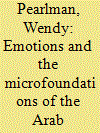

|
|
|
|
|
| Publication |
2013.
|
| Summary/Abstract |
In any political setting, a few people will defy political authority. The main challenge for theories of rebellion is to explain when and why others join en masse. Scholarship on social movements typically develops answers to this puzzle on the basis of either of two microfoundations. Explanations that conceptualize individuals as utility-maximizers contend that they protest as a means to other ends. Explanations that see individuals as driven by values and beliefs suggest that people protest for the inherent benefit of voicing dissent. Both perspectives generate compelling explanations. Yet how do purposeful individuals act when utilitarian calculations and cherished values recommend contrary courses of action? Why might an actor prioritize one or the other at different points in time? Taking on these questions, I argue for an approach to microfoundations that focuses on emotions. Emotions such as fear, sadness, and shame promote pessimistic assessments, risk aversion, and a low sense of control. Such dispiriting emotions encourage individuals to prioritize security and resign to political circumstances, even when they contradict values of dignity. By contrast, anger, joy, and pride promote optimistic assessments, risk acceptance, and feelings of personal efficacy. Such emboldening emotions encourage prioritization of dignity and increase willingness to engage in resistance, even when it jeopardizes security. When instrumentality and values offer different answers to the question of whether to resign or rebel, therefore, emotions can shift individuals toward one or the other. I ground this argument in findings from the neurosciences and illustrate it with evidence from the 2011 uprisings in Tunisia and Egypt and the absence of an uprising in Algeria.
|
|
|
|
|
|
|
|
|
|
|
|
|
|
|
|
| 13 |
ID:
187027
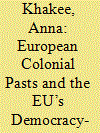

|
|
|
|
|
| Summary/Abstract |
How is EU democracy promotion made compatible with European colonial powers’ recent history of quashing democratic and human rights? A discourse analysis of general programmatic EU statements and texts related to selected salient historic junctures – the Algerian Hirak, the 2018 Democratic Republic of Congo elections and the Arab Uprisings – reveals that EU policy-makers reconcile the colonial past and the democracy-promoting present mostly through a silencing of colonialism. The consequence is that colonial-time hierarchical discourses are left undisturbed. Moreover, the projection of peace, democracy and the rule of law becomes not only the oft-noted break with the past, but also a continuity with colonial discourses of Europeans as ‘democratic’, ‘humanitarian’ and ‘civilised’.
|
|
|
|
|
|
|
|
|
|
|
|
|
|
|
|
| 14 |
ID:
177692


|
|
|
|
|
| Summary/Abstract |
Religious discourse has a fundamental impact on sectarian violence, stability and sovereignty across the Gulf region. Amidst an increasingly volatile political and social situation, fatwas serve as a prominent factor in the behaviour and beliefs of individuals and groups across the Gulf. Fatwas have long been a source of great interest in religious studies and international law yet very little work has been undertaken in politics. This article aims to analyse the impact of fatwas from Shiʿi and Sunni clerics in the promotion of sectarian violence across Bahrain in the aftermath of the Arab Uprisings. In this article, it will be argued that religious discourse has a significant impact in determining the nature of the political relationship between the components of society in Bahrain. We argue that fatwas serve a key role in regulating life across the island and, in the aftermath of the 2011 uprisings, in facilitating sectarian violence.
|
|
|
|
|
|
|
|
|
|
|
|
|
|
|
|
| 15 |
ID:
146652


|
|
|
|
|
| Summary/Abstract |
In the aftermath of the Arab uprisings Foreign Terrorist Fighters (FTFs) have emerged as a significant security challenge. Since the 1980s and the Soviet occupation of Afghanistan the notion of a ‘foreign fighter’ has been closely linked, if not synonymous, with those ideologically or religiously motivated individuals who have travelled to join conflicts in Islamic lands. This article will explore the contemporary FTF movement, offering a comparison of Afghanistan in the 1980s and Syria in the contemporary period. It will explore the international community’s expansive responses to the challenge of FTFs, with special focus on the role of the United Nations.
|
|
|
|
|
|
|
|
|
|
|
|
|
|
|
|
| 16 |
ID:
183863


|
|
|
|
|
| Summary/Abstract |
Ten years on since the Arab uprisings we are in a position to assess how the nexus between knowledge, discourse and practice had a bearing on the trajectory of the protests. They represented hope and change for millions of Arabs in the region, but to what extent was that the case for onlookers in Europe and the US, and did western discourse on events in the Middle East matter? While the toppling of longstanding dictators was met with jubilation by Arab populations, it conversely created anxiety and fear in many western governments. This was reflected in the shift from an initially celebratory discourse in western commentary to disappointment, pessimism and disavowal of the uprisings. Within a year, op-eds and academic articles were asking whether the ‘Arab Spring’ had turned into an ‘Islamist winter’, reverting to Orientalist narratives about the inevitability of conflict, bloodshed and sectarianism in the Middle East. I argue this discourse had implications for the outcome of the uprisings as ‘latent Orientalism’ translated into ‘manifest Orientalism’ and western states hesitated to support opposition groups they initially encouraged and emboldened. I begin the article with a study of western discourse in the first year of the uprisings, which I then situate within a long durée history of western policy and representation of the Middle East. In the final sections I consider the role of scholarship and think tanks as mediators of Orientalist discourse.
|
|
|
|
|
|
|
|
|
|
|
|
|
|
|
|
| 17 |
ID:
143170
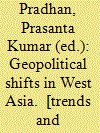

|
|
|
|
|
| Publication |
New Delhi, Pentagon Press, 2016.
|
| Description |
xxxiv, 246p.: maps, figures , tableshbk
|
| Standard Number |
9788182748774
|
|
|
|
|
|
|
|
|
|
|
|
Copies: C:2/I:0,R:0,Q:0
Circulation
| Accession# | Call# | Current Location | Status | Policy | Location |
| 058443 | 320.12/PRA 058443 | Main | On Shelf | General | |
| 058444 | 320.12/PRA 058444 | Main | On Shelf | General | |
|
|
|
|
| 18 |
ID:
142175
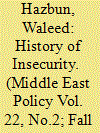

|
|
|
|
|
| Summary/Abstract |
In recent decades, scholars of the Middle East have come to understand that the long-dominant neorealist approaches, with their focus on the relative material power of states, fail to explain the dynamics of security politics in the region. As Gregory Gause explains, Arab states “have overwhelmingly identified ideological and political threats…to the domestic stability of their ruling regimes as more salient than threats based upon aggregate power, geographic proximity and offensive capabilities.” While Gause refers to threats “emanating from abroad,” others have highlighted that the primary function of security policy in Arab states is to secure the interests and power of the ruling regimes from ideological and political threats that emanate from within the territory of the state.
|
|
|
|
|
|
|
|
|
|
|
|
|
|
|
|
| 19 |
ID:
139774
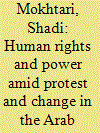

|
|
|
|
|
| Summary/Abstract |
The stunning popular uprisings in the Arab world in 2011 inaugurated an era of protest, revolutions and political transitions, on the one hand, and heightened repression, civil war and renewed authoritarianism, on the other. During this era the human rights paradigm was often at the fore of political and social contests, repeatedly being claimed, co-opted and appropriated. This paper argues that within the Middle East’s uprisings and transitions, deployments of human rights had notable emancipatory effects; yet invocations of the discourse continued to emerge from, converge with or (re)produce various power-laden domestic and international political dynamics. The human rights paradigm served as a primary discourse of the most serious challenge to Arab authoritarianism and its Western sponsorship in contemporary history, with the outcome in Tunisia exemplifying its potential to influence both the processes and substance of genuine political change. The period’s events and ethos also created openings for rights claims to be made by marginalised groups and facilitated local actors’ agency in driving the region’s human rights politics and agendas after decades of ‘human rights in the Arab world’ being a discourse largely driven by foreign actors. Yet the paradigm was also frequently curtailed or instrumentalised by local rulers and Western powers clinging to longstanding authoritarian arrangements, as well as by emergent political actors vying for power.
|
|
|
|
|
|
|
|
|
|
|
|
|
|
|
|
| 20 |
ID:
124253


|
|
|
|
|
| Publication |
2013.
|
| Summary/Abstract |
Since the end of the cold war over two decades ago, the world has withnessed fundamental transformation at many lavels in the international system. These changes were revolutionary. "One could argue that six revolutions are dominating in what we called the long twenty first century. Starting in 1989, the revolution in international affairs, the revolution in economics affairs, the revolution in technological affairs, the revolution in societal affairs, the regulation revolution and finally the revolution in military affairs."
|
|
|
|
|
|
|
|
|
|
|
|
|
|
|
|
|
|
|
|
|